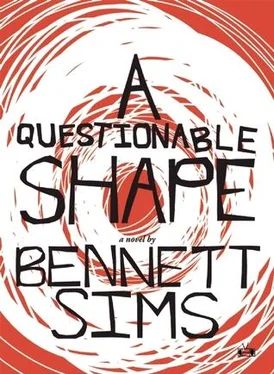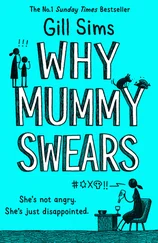The mistake Matt is making is the same one I made yesterday, when I grew anxious over Rachel’s list (which did not, thankfully, include any Michael Fureys). Namely, Matt is treating the theater as a place that Mr. Mazoch would think of. If the theater meant something to both of them, Matt must be reasoning, and if it meant as much to Mr. Mazoch as it did to him, then Mr. Mazoch would ‘think to come here.’ That is why Matt grew so excited at the sight of the Netflix envelope, and why he kicked himself for not having thought to come here before. That’s also why he must feel such anger and disappointment now, as though Mr. Mazoch had somehow let him down by letting Citiplace slip his mind. By forgetting — out of self-centeredness or indifference or neglect — this place that meant so much to his son.
But the problem with this reasoning is that Mr. Mazoch couldn’t ‘think to come here.’ Matt hasn’t miscalculated his father by failing to find him here, and Mr. Mazoch hasn’t betrayed his son by failing to come. For it isn’t Mr. Mazoch’s mind that Matt has to try to imagine his way into, or Mr. Mazoch’s mind whose memories, impulses, and destinations Matt has to try to anticipate. It isn’t even Mr. Mazoch, anymore, whom Matt is really looking for: it’s Mr. Mazoch’s undead body. That is the paradox: Matt has to think his way into the mind of a creature that may not have one. A creature of unknowable impulses, of ineffable instinct. Given that that’s the case, it’s no wonder that Matt’s emotions are so confused. Because on the one hand, the undead behave as if they are consciously retrospective beings, returning to sites that ‘meant something’ to them in their mortal lives. Yet on the other hand, it is as if they are blank automata, shuffling to these landmarks absently, merely carrying out a program, like robots of remembering. On the one hand, they are creatures of pure memory: they return only to sites from their past, and can find their way back to neighborhoods buried far in their childhoods. But on yet another hand (and this is turning out to be a real Shiva of dialectical reasoning), they are creatures of pure forgetfulness: the sites they return to, so potent with mortal nostalgia, mean nothing to them, and they navigate them unconsciously, are as sleepwalkers there. What they are propelled by is a blind drive. They know they want to return to certain spaces, but they don’t know why. They know the spaces are there, but they do not see them. In this way, they inhabit a radical in-between-ness: between total recall and total amnesia, total nostalgia and total obliviousness, between all remembering and all forgetting. And not only in between, but both at once, somehow. It is as if they recall the space (as a destination) at the exact same time as they forget it (as conscious content, as memory). So it is as if the undead are constantly being fed mnemonic madeleines, except that the tea the madeleines are steeped in is actually Lethe water: the crumbs of each memory come soggy with their own forgottenness, they are simultaneously remembering the place (qua destination) and forgetting it (qua memory) while they chew. Even as the site is recalled it dissolves, and what is left, in the undead, is something like an aftertaste of memory, a sudden and inexplicable craving for place. They know they want to go there — the house, the movie theater, the campus lawn — but they don’t know why.
Staring at the back of Matt’s head through the binoculars, I know that he knows all of this. Still, knowing it does not help, and I can only imagine what he is feeling right now. Something like the rejection I felt yesterday, when imagining Rachel’s list; or else the rejection that I would feel (exponentially bitterer) if I failed to find her at the campus lawn. Whatever the scale of Matt’s disappointment, I do know that he can’t go on feeling this way. One month seems like enough for a lifetime. As if he can sense me staring at him, he turns around now, and I lower the binoculars. He has finally given up on the site, it looks like. His distant silhouette waves at me, and I wave back, and with that we begin to trudge across the rooftop toward one another.
We meet halfway, by the safety ladder, where Matt nods once in greeting before bending to grip the handlebars. ‘Hey,’ I say, and he pauses. ‘Why don’t we come back here tomorrow?’ I ask. ‘Or Friday?’ His back straightens when I say this. Letting go of the ladder, he stands to face me, and in the moment before he speaks, I dread what he is about to say. ‘About tomorrow,’ he says. ‘I think I need a break. Maybe decompress, do some reading. What if we take the day off?’ I nod quickly in relief. ‘Sure,’ I say, ‘no problem. We can always come back Friday.’
‘About Friday,’ he says, and I feel the dread return. ‘I know we settled on that deadline. But we hadn’t foreseen—’ He looks away, searching for words. ‘These are extenuating circumstances,’ he continues. ‘Someone’s prowling my dad’s property. What if they come back? I can’t just abandon the place now. I need you there with me.’ Why not give it one more week, he asks? What do I say?
‘Matt,’ I say. He doesn’t respond, or even look at me. He has no doubt been preparing this speech the whole time we’ve been standing here, and now he is bracing himself for the speech that we both know I am supposed to have been preparing as well. How he’s getting desperate. How we set the deadline for a reason. How I’ll quit if he doesn’t.
But I find that I cannot say this, any of it. At least not here, not yet. Not after all the disappointments of today, not with Matt meekly avoiding my eye, and not mere moments before he has to make his descent, braving the katabasis of the safety ladder, to climb down into that hellish, heartbreaking parking lot, where once again his deadbeat undead dad has jilted him. So instead I say, while shaking my head, ‘Let me run it by Rachel.’ Hopefully he will recognize this for the stalling tactic that it is, and will call it quits on his own. For now he nods, then turns without a word to clamber over the top rung. He keeps his head bent on the climb down, watching his feet and the emptiness of the parking lot beneath him, until he disappears beneath the rooftop’s ledge. I give him a lead of five or six rungs before following him.
TONIGHT, AFTER MUCH STURM UND DRANG, I finally talk Rachel into practicing defamiliarization with me. Presently we’re trying it out in the living room, sitting in meditative silence and locking eyes across the coffee table. Because the room is dim and the atmosphere one of intense concentration (and also because both pairs of our hands have come to rest pronated on the tabletop), anyone seeing this might mistake it for a séance. Which wouldn’t be altogether inaccurate: we are indeed invoking a kind of dead. Each of us is invoking undeath in the face of the other.
‘It’s a hateful thing to do,’ Rachel protested, when I first proposed the exercise to her. This was shortly after I got home. We had just finished discussing how my day went, and I had chosen — in the end — not to run the extension by her. In fact, I didn’t run anything by her: neither the broken windows, nor Matt’s suspicion that someone has been ‘prowling’ his father’s property. I added these to my mental checklist of things to confess to her one day — when they will be too far past to worry her — as I summarized our trip to Citiplace. When I announced our surprise hiatus tomorrow, she smiled and clapped her hands: ‘A holiday!’ She would take the day off too, she said, from the shelter. But how should we celebrate tonight? It was here that I suggested — in what I thought was an offhand way — that we try another exercise like yesterday’s. I opened our copy of FIGHT THE BITE to the de familiarization chapter and handed it to her. Why not pass the evening practicing estrangement techniques?
Читать дальше












